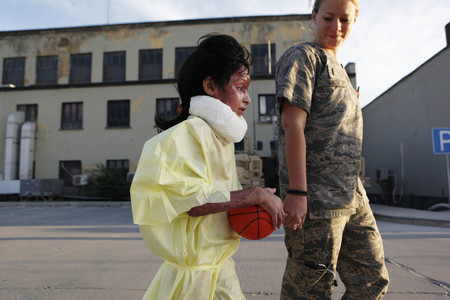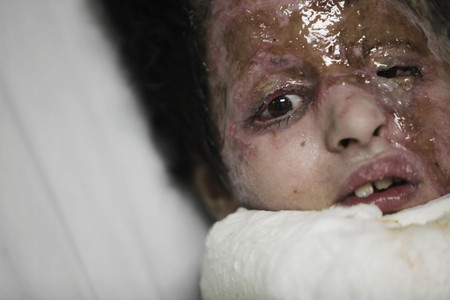She can smile again
BAGRAM AIR BASE, AFGHANISTAN -- The American military doctors watched in horror as the oxygen mask on the young Afghan girl's face started to melt.
The 8-year-old's skin was smoking from white phosphorus, a lethal chemical. Her hair was burned away. Her face, head, neck and arms were scorched yellow, pink and black.
When the doctors tried to scrape away the dead tissue, flames leaped out.
More than 15 surgeries later, Razia is scheduled to be released today from the U.S. military hospital at Bagram Air Base.
She can smile again. She has learned to say "ice cream" in English and play catch with nurses. But her skin will remain scarred, her hair will never grow back, and the mystery behind her tragedy remains unsolved: Who fired the white phosphorus?
After months of care, her nurse, who is a mother of three girls back in the United States, considers Razia her fourth daughter.
"You're just not even sure whether this child is going to make it or not," said Capt. Christine Collins, who is stationed at Nellis Air Force Base. "And then seeing her actually walk for the first time, taking her outside for the first time ... it's one of those life-changing things that you'll never, ever forget."
Razia had just finished breakfast when U.S., French and Afghan forces appeared near her village north of Kabul on March 14. Abdul Aziz, a father of nine, told his children to get inside their mud-brick house.
Two shells ripped through the house. Fire, smoke and dust filled the room.
"The sound of the blast was very strong, and I was almost unconscious. I couldn't think. My children were shouting at me: 'Wake up! You're burning!'" Aziz said.
Flames engulfed Razia. Aziz dumped a bucket of water on her, but the chemicals burned on. Two of Razia's sisters lay dead. Five other family members, including the mother, were wounded.
Aziz took Razia to the Afghan soldiers near his house, but they could do nothing. A private Afghan vehicle took them to the nearby French base. Razia slipped in and out of consciousness as her father poured water on her face to keep her awake.
------
White phosphorus burns until it's gone. It can burn right down to the bone.
U.S and NATO troops use white phosphorus to illuminate targets, create smoke screens and destroy old bunkers, but they say they don't use it as a weapon. While white phosphorus is not banned under international law, human rights groups denounce its use in populated areas. U.S. officials allege that militants have used white phosphorus in mortars or rockets at least 12 times in the past few years.
Aziz is convinced that international forces fired the round that destroyed his house. French troops in green armored personnel carriers, U.S. troops in tan Humvees and Afghan soldiers gathered nearby before the attack, Aziz said. The Taliban in his region have only AK-47s, heavy machine guns and rocket-propelled grenades, he said.
A U.S. military spokeswoman with NATO's security force said officials can't be certain whether it was their round or an enemy round that hit Razia's house.
"Either scenario is possible, and equally regrettable," Maj. Jennifer Willis said. "One thing is certain: Razia will have the best care that we can give her."
------
A U.S. medevac helicopter stopped at the French base to pick up Razia. Medic Sgt. Stephen Park looked in a waiting ambulance and saw the girl burned "from head to waist."
"And the first thing I said to them was, 'Is she still alive?'" Park said.
A father himself, the 33-year-old from Reno picked up the girl and told his pilots to fly at top speed. They arrived at Bagram's SSG Heath N. Craig Joint Theater Hospital 20 minutes later.
"It was intense, very emotional," Park said. "When we got (to Bagram), I think even all the ER staff and all the doctors and nurses didn't think she was going to make it."
Victims with burns on more than 50 percent of their bodies don't survive. Razia had burns on 40 percent to 45 percent.
Capt. Autumn Richards, a pediatrician from Fort Bliss, Texas, didn't think the girl would live. White powder covered her skin, and flames shot out from her body.
"It was a very surprising thing to us, and very scary," Richards said. "I do remember trying to keep the oxygen off her, because of course that's a flammable gas, and we all realized after the fact that it was a very dangerous situation."
Collins served as Razia's primary nurse during the first weeks of care. Razia, who was hooked up to a feeding tube, wouldn't respond to the nurses and doctors even after a week in the hospital. Collins used her experience as a mother to reach out. Nurses lifted Razia out of bed, and Collins rocked her for an hour.
"After that she was a completely different child," she said, her voice cracking. "She smiled for the first time. She was looking at her father and started talking to her father a lot more. And at that point I knew we would have this bond that would probably last a lifetime with her."
Every day Collins had a goal: Get Razia out of bed. Sit her in a chair. Create a moment of normalcy. A month into Razia's recovery, Collins decided it was time for her to walk. The first day she took three steps, an effort that exhausted her. Within weeks she could walk to the hospital kitchen. Ten weeks after being injured, she could run.
In moments of pain, Collins rocked Razia, sang to her and wiped away the girl's tears.
"It was very intense, a labor of love, in working with her. It was an absolute pleasure and honor," said Collins.
The team has tried to help Razia feel normal. Nurses painted her fingernails red, a splash of color next to scarred skin. A friend in America sent a black wig, which Razia wore with a wide smile.
Razia still appears shy. Her nurse says she has good days and bad days.
But on a recent day, Razia led nurse 1st Lt. Michelle Smith to the cafeteria, where she loaded kiwis, bananas, a Gatorade shake and an ice cream bar into her wheelchair. Doctors and nurses gave her high fives and smiles.
------
Doctors expect Razia to recover -- barring any serious infections -- but the scars will remain. The skin on her arms, legs, chest and face are a scaly red. Most of her head is scarred red scalp. Much of her left ear is burned off.
The staff worries that Razia may never have a normal life in Afghanistan, where women in the countryside are mostly defined by their marriages.
At the hospital, Razia's father overheard a police officer tell another official: "No one will marry her."
"I was so angry I wanted to run after him and punch him," Aziz said.
When Razia is released from the hospital, she won't find her old home. It was destroyed by the rounds that disfigured her body. Her wounded relatives have recovered but show signs of stress disorder.
Her father once ran a vegetable shop, but he has no more money. He is thankful to the American team for the extraordinary medical care but remains laden with worry.
His family's future -- and Razia's -- is uncertain.


















